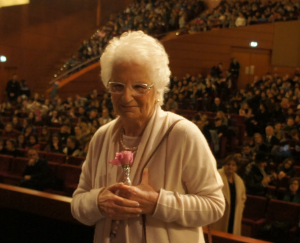The 90 years of the Holocaust survivor Liliana Segre, a champion against hatred and indifference
 President Sergio Mattarella led the tributes to Liliana Segre as the Holocaust survivor and Life Senator celebrated her 90th birthday on Thursday. The head of State called Segre and thanked her for her efforts to combat hatred, violence and discrimination, sources said.
President Sergio Mattarella led the tributes to Liliana Segre as the Holocaust survivor and Life Senator celebrated her 90th birthday on Thursday. The head of State called Segre and thanked her for her efforts to combat hatred, violence and discrimination, sources said.
Born into an Italian Jewish family in Milan, Liliana Segre was deported to the Auschwitz death camp at 13 and was one of the few survivors of the children taken there. Her father and her paternal grandparents were killed in the Shoah, and her mother died when Liliana was a baby. She was liberated from Malchow, one of the sub-camps of Ravensbrück Nazi concentration camp, on May Day 1945.
For more than a half-century she remained quiet about her tragedy, but in the 1990s she began speaking up and visiting classrooms. She became one of the more active witnesses of the Holocaust, speaking to thousands of students and groups all over Italy.
She felt the obligation, as she said, to “pass on the memory”. “Indifference – she said – is more guilty than violence itself. It is the moral apathy of those who turn away from others: it also happens today with racism and other horrors of the world. Memory is like a vaccine against indifference.”
President Mattarella nominated her Life Senator in 2018. A year later, to counteract the rise of a political clime marked by racism and nationalism, she called for the creation of a parliamentary commission to investigate hate, racism and social media. After a barrage of antisemitic messages and threats, she was assigned a security detail.
In an interview published on Thursday by the Italian newspaper La Stampa, Segre expressed dismay about the case of Willy Monteiro Duarte, a 21-year-old who was recently beaten to death at Colleferro, near Rome. “We are in the grip of the problem of a Fascist mentality which still pervades us and which we have not done enough to free ourselves of,” she said.
She added that she felt the young man’s death was “like a personal defeat. “It made me think that all that I have tried to do against violence and hatred has served for little,” she said. “If there are still people who go around trying to resolve their personal defeats by beating up others, we are still distant from being a civilized society”.
